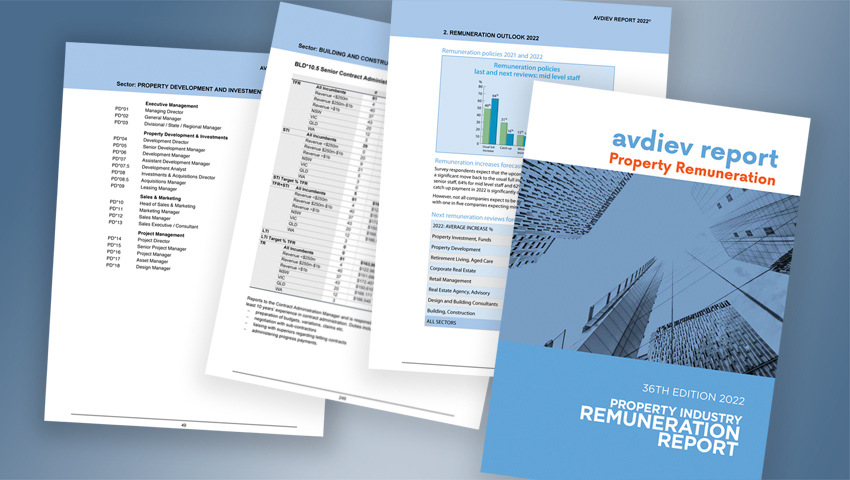Keeping pay competitive in a tight market

Property companies face a challenging environment as they prepare for pay reviews this year. The effects of the pandemic are still playing out on the property industry, inflation is soaring, and the labour market is tight. The contrast with the last few years is stark, when pay cuts and wage freezes were seen.
Remuneration is also under scrutiny amid calls for greater pay transparency and more concerted efforts to close the gender pay gap.
Amid the complexity, ensuring employee pay is aligned with market rates is no simple matter.
Considerations at pay review time
Annual pay increases remain a key factor in keeping employees happy and engaged, and are of particular importance now given staff shortages are affecting some property sectors and the labour market is tight.
Inflation
Rising inflation will be a central factor in wage discussions this year.
With petrol, construction and food prices rising sharply, the CPI is sitting at 5.1% for the year to March 2022, the highest rate of underlying inflation since 2009. Rising inflation will undoubtedly put upward pressure on remuneration as any increase lower than inflation means a wage cut in real terms.
Superannuation
Another factor employers will be taking into account during pay discussions is the rise in the Superannuation Guarantee (SG) to 10.5% from 1 July 2022.
For the July 2021 increase in the SG, 76% of Avdiev Report’s survey respondents told us they added the increase to total remuneration, while 18% absorbed the increase into remuneration. We expect that employers will take a similar approach this year.
Non-monetary measures
While pay rises remain central to attracting and retaining staff, companies are also increasingly looking beyond remuneration in their quest to be a desirable place to work. Such measures include staff development opportunities, positive and inclusive cultures, pathways to promotion, or employment benefit programmes.
Employees are also looking for more from their employers. They want to work for organisations that are consistent, transparent and fair.
Working from home is another key consideration for many employees. Despite predictions to the contrary, working from home has persisted beyond pandemic lockdowns as employees have become accustomed to the reduced travel time, family-friendly flexibility and convenience. Many companies have maintained flexible work arrangements to attract and hold onto staff post pandemic.
Property industry pay rise of up to 5% expected
Avdiev Report’s latest survey, conducted in March 2022, showed property businesses across all sectors expect to give employees average pay rise ranging from 2.5% to 5% depending on the sector.
For upcoming pay reviews, Property Investment Funds were predicting the biggest pay increase with a median rise of 5.0% expected. Real Estate Agency and Advisory companies were expecting a median rise of 4.5%, while Development and Construction firms were anticipating pay gains of 4.0% and Design and Building Consultants 3.0%.
The jump in inflation since March is likely to mean remuneration increases exceed these predictions.
Retirement Living and Retail Management businesses expected to give employees a 2.5% rise. Both these sectors will be impacted by the minimum wage case in early June.
Realign remuneration to the current market rates
After almost two and a half years of pandemic related disruption to remuneration, through minimal increases, pay freezes and pay reductions, we have been seeing an uptick in demand for the latest remuneration data to get back in touch with what the market is paying property industry roles and non-executive directorships.
The latest property industry remuneration data is available in our 2022 Avdiev Property Industry Remuneration Report. Follow this link for more information or to purchase a copy.

Trending issues
There are some interesting shifts underway in the remuneration landscape.
Pay transparency
Secrecy about remuneration has long been accepted in the Australian workplace, but there is a growing school of thought that says it may contribute to the gender pay gap and be a factor in holding down wages. “Openness and transparency” about pay and employment conditions “serves us all”, said Reserve Bank Governor Philip Lowe. In several states in the United States, job ads must include a minimum and maximum salary range. The United Kingdom is also set to introduce a scheme whereby job ads must reveal the expected salary.
Similar moves are underway in Australia, with PwC in April disclosing projected pay ranges for staff for 2023. Two major Australian employers, Westpac and the Commonwealth Bank, have removed pay secrecy requirements from their employment contracts.
The incoming government has promised reform in this area. During the campaign, Labor promised if elected it would prohibit pay secrecy clauses.
Pay transparency will make rigorous remuneration practices more important than ever.
Gender pay equity
We are also seeing greater transparency and data around the gender pay gap. Employers with 100 or more employees must submit their gender equality metrics every year to the Workplace Gender Equality Agency. According to the latest data, the national gender pay gap sits at 13.8% and our March survey found that only about three quarters of the companies surveyed pay men and women the same for the same job.
Labor has also promised reform in this area, with pledges to strengthen the capacity of the Fair Work Commission to increase pay in poorly paid, female-dominated industries and to address the gender pay gap in the public service.
Mid-cycle pay rises
The tight labour market has prompted many property companies to conduct pay reviews mid year in an effort to keep pace with the heated market jobs market.
Many property businesses are experiencing high staff turnover and are having difficulty filling vacancies, and there are calls for an increase in skilled migration. Offering pay rises mid-cycle is a way to hold onto staff and attract new talent, while also ensuring employees don’t succumb to temptation from headhunters.
We hope this newsletter is informative and helps you navigate the evolving remuneration environment in such complex times.
Please contact me (debra@avdievreport.com.au) if you would like to order our 2022 Avdiev Property Industry Remuneration Report or commission a specially tailored benchmarking review.
Best regards
Debra Moloney | Avdiev Report
debra@avdievreport.com.au | www.avdievreport.com.au

